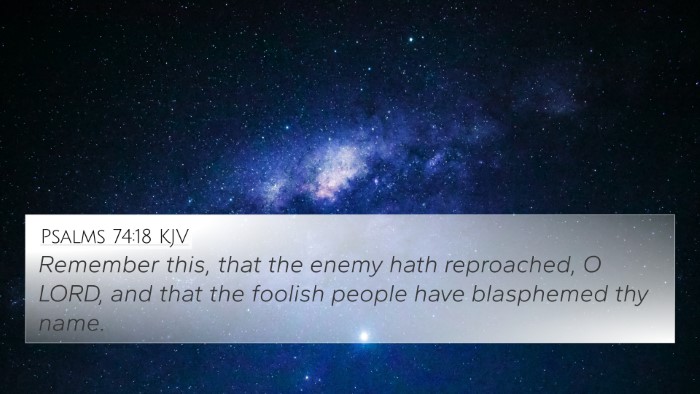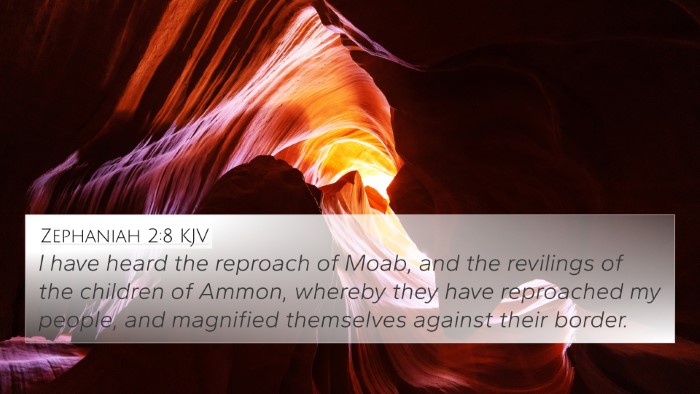Lamentations 3:61 Interpretation and Insights
Lamentations 3:61 states, "Thou hast heard their reproach, O Lord, and all their imaginations against me." This verse occurs in the context of the prophet Jeremiah's lament over the suffering of the people of Israel and their enemies' taunts against God and His people. In examining this text, we uncover deep theological themes and emotional insights.
Overview of Commentary Insights
The verse underscores the reality that God is intimately aware of the reproaches and imaginations against His people. This highlights not only His omniscience but also the relational nature of God's involvement with His creation.
Matthew Henry's Commentary
- God's Awareness: Matthew Henry emphasizes that God "hears" the people's troubles and should act upon their lamentations. God is not distant; rather, He is actively engaged in listening to the cries of His people.
- Reproach: The reproaches mentioned are the scorn and mockery faced by Jeremiah and the Israelites. This serves as a reminder that followers of God may face ridicule, yet God is aware of their suffering.
- Hope in Despair: Henry elucidates how this acknowledgment of reproach ultimately leads to a hope of vindication and rescue by God. Even in deep lament, there is an underlying current of trust in God's justice.
Albert Barnes' Commentary
- Divine Justice: Barnes explains that the verse reflects a plea for divine justice. The speaker feels wronged and desires God to take action against the injustices they face from their adversaries.
- Imaginations Against Me: The "imaginations" refer to the plots and schemes of the enemies, indicating that evil thoughts are not merely fleeting but can have deeply harmful consequences.
- Encouragement for Believers: Barnes reminds us that when the faithful suffer, they should bring their burdens to God, who considers their cries and holds their adversaries accountable.
Adam Clarke's Commentary
- Personal Experience: Clarke observes that this verse reflects Jeremiah's personal experiences and emotions, reminding us of the significance of expressing sorrow and fear to God.
- Comprehensive Grievance: He notes that the collective grievances against God from the people are directed towards their adversaries, illustrating that their struggles are part of a larger divine narrative.
- Spiritual Reflection: Clarke emphasizes that moments of distress require spiritual reflection and acknowledgment of God's presence, reinforcing the idea that God is acutely aware of human suffering.
Cross-References to Lamentations 3:61
- Psalms 31:12: "I am forgotten as a dead man out of mind: I am like a broken vessel." - Reflects feelings of abandonment.
- Psalms 42:9: "I will say unto God my rock, Why hast thou forgotten me? why go I mourning because of the oppression of the enemy?" - God hears our laments.
- Isaiah 53:3: "He is despised and rejected of men; a man of sorrows, and acquainted with grief." - The connection to shared suffering.
- Micah 7:7: "Therefore I will look unto the Lord; I will wait for the God of my salvation: my God will hear me." - A message of hope amidst hardship.
- Romans 8:31: "If God be for us, who can be against us?" - Encouragement that God stands with His suffering people.
- 2 Corinthians 1:5: "For as the sufferings of Christ abound in us, so our consolation also aboundeth by Christ." - Comfort in Christ's identification with human suffering.
- Revelation 21:4: "And God shall wipe away all tears from their eyes; and there shall be no more death, neither sorrow, nor crying." - Promises of future restoration and relief from suffering.
Thematic Connections
The verse represents a rich thematic connection to the overall biblical narrative concerning suffering, God's justice, and divine compassion. These themes interweave throughout Old and New Testament scriptures, highlighting how God hears and understands the depths of human trial.
Applications for Study
For those seeking to deepen their understanding, the integration of cross-reference methodologies serves as essential tools in Bible study:
- Using a Bible Concordance: This tool can help identify verses that hold thematic similarities or contrasting teachings.
- Bible Cross-Reference Guides: Such guides provide structured ways to navigate related scriptures, offering comprehensive insights into topics.
- Bible Chain References: This method links verses by thematic groups, assisting in seeing the broader narrative.
Conclusion
In summary, Lamentations 3:61 is a poignant reminder of the reality of human suffering and God’s vigilant presence in our turmoil. The insights from public domain commentaries illuminate the nuances of this verse, encouraging believers to bring their burdens to God and find hope in His ultimate justice.
As we cross-reference and explore the connections between scripture, we gain a deeper understanding of God's character, reaffirming our faith amidst adversities.







